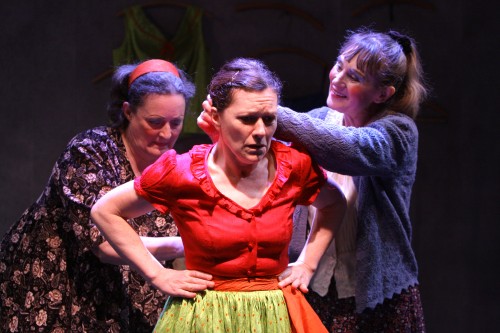
(l to r) Nancy Robinette, Jennifer Mendenhall, and Sybil Lines in The New Electric Ballroom by Enda Walsh. Directed by Matt Torney. Photo: Carol Pratt.
Countless poets have asked the question – is love worth the risk of a broken heart? Are fleeting moments of a racing pulse and desire’s first flush worth facing the possibility of loss and loneliness?
To those questions, Irish playwright Enda Walsh adds – is it better to just stay safe inside? In The Walworth Farce and The New Electric Ballroom, playing now in repertory at Studio Theatre, “inside” is both the literal confines of a fixed space and the “inside” of one’s own mind and heart. “Inside” is both as safe and confining as the womb, the physical space as limited as the mental world is limitless. The choice of staying in or going out is of vital concern, stamping the characters with an equal dose of longing and repulsion.
Whereas The Walworth Farce deals with how this choice impacts three men and the woman who comes into their space, The New Electric Ballroom turns that question over to three women and the man who enters. “And enter then” is a phrase constantly repeated here, a reminder that no matter how safely we bind ourselves against risk, it always finds a way to seep in to our carefully constructed lives. Just as in The Walworth Farce, the three women in The New Electric Ballroom have constructed a daily world of stories, re-enacting the past where two elder sisters first met and lost love. The stories here are also a warning of the risk of the outside.
The results are not as physically violent, but the women are just as scarred, the desperate longing to escape from the demeaning cycle of small-town gossip driving them deeper into their minds.
It’s a better constructed play than the other – if more cliched in its setting, dried up spinsters made up like a Baby Jane tea party. But despite that, Walsh’s development of both his hallmark poetic language and the strength of the theme is superior in this play written just one year later. Matt Torney also has very capably directed the ensemble of four through action with no intermission, composing the thematic ebb and flow of the possibilities of love, loss and risk as hypnotic as the sea outside the sisters’ house.
As the two older sisters Breda and Clara, Sybil Lines and Nancy Robinette sketch two distinctive women – “Breda the bad girl” still confident of her alpha female dominance over the trembling Clara. The two are locked in sibling rivalry of the worst kind – each loved and lost the same man, the mythic bad boy of sex, the rock star. Every day they play out their competing stories of what went down at the dancehall one fateful night for their younger sister, the never-been-kissed Ada (Jennifer Mendenhall), as a warning and a reminder of the dangers of the world outside. “People talk,” they say with frightening menace.
Into this routine with increasing frenetic frequency comes the fishmonger Patsy (Liam Craig), whose dreary life contains the possibility of happiness for himself and Ada, if he can only escape the trap of mundane words and rise to poetic heights. His incredible transformation is easily the high point of the play, and brought the house to applause at the performance I attended. That fact is crucial to understanding the allure of The New Electric Ballroom – unlike The Walworth Farce, where the possibility of escape with another is pretty bland (A Tesco grocer who wants to take you to Brighton? Ok. A rock star who can swivel his hips and croon? Now you’re talking!) – here the longing for the outside world is made manifest in the potential union of two lonely souls whose characters are written strongly enough, and mythically enough, that we care deeply.
There are beautiful moments of master class acting. Robinette’s Clara nervously pressed up against the door between a child’s innocence and an adult’s sexuality. Lines’ Breda capturing the power of lust and vibrant youth. Mendenhall’s quiet ache fills the silence, while Craig perfectly brings to life the battle between longing and fear of loss. They are all wrenchingly good.
The beauty of watching an Enda Walsh play is actually in the listening. Words, and their power to both entrap and free the speaker and the listener, are at the heart of it. Even though the loss is painful, I wish I could listen again. I suppose that puts me firmly in the “better to have loved and lost” camp. Walsh may be showing us what happens when you reject that truth, internalizing the pain of not loving and losing. I’m not sure yet, but I love the exploration.
The New Electric Ballroom plays now thru May 1. The Studio Theatre is located at 1501 14th Street NW, Washington, DC 20005. Closest Metro stop: McPherson Square (Orange/Blue lines), Dupont Circle (Red line). For more information call 202.332.3300.

